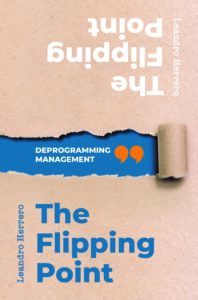Extracts taken from my new book ‘The Flipping Point‘. [1] A flipping point in the trend for adopting absurd management ideas needs to be reached. ‘The Flipping Point‘ [1] contains 200 short vignettes exploring what ’deprogramming management’ may look like.
We want the organizational flexibility of Lego. We recruit for the rigidity of a jigsaw
We want the organizational flexibility of Lego. We recruit for the rigidity of a jigsaw: pieces that fit perfectly in a space. When a jigsaw piece goes on maternity leave, or leaves the company, we will replace it with a similar piece that needs to fit in. Exactly. No replacement, hole is visible, jigsaw incomplete. The jigsaw gives us the comfort of the permanent structure of a castle (looks like a castle, the picture of a castle is on the box, not a dragon, or a boat, it’s that particular castle) but tomorrow we want the castle to be a gazelle, or maybe Formula 1, or perhaps something googlesque. The jigsaw needs the ‘expert pieces’, the Lego needs the re-usable pieces. The jigsaw is fixed, no dragons with the pieces of a boat. The Lego is a reconfigurable dragon today, farmhouse tomorrow. Lego or jigsaw, this is all you need to decide in organizational design. Organizational charts are the picture of jigsaws.
For those who want both: you need to at least settle for a percentage of reconfigurable Lego structures in the company. Leading jigsaw organizations are leading prisons, even if they look like golden cages. And you always, always drop that piece in the corridor. Finding the replacement is exhausting.
If you have a choice, (re) design an organization on the basis of ‘who needs to know what’.
If you have a choice to (re) design an organization on the basis of ‘who needs to do what’ or ‘who needs to know what’, always start with ‘who needs to know what’. Then, match against the alternative design based on the former ‘who needs to do what’. If there is no good match, you have just discovered a problem and saved thousands on consulting fees to rescue an unworkable organizational structure.
Organizational design, as usually practiced, is quite irrational. Mostly it’s based upon a military concept of command and control. It is only when alternative designs based upon different criteria are let to compete with each other conceptually, that one can see the pros and cons of each and the kind of trade-offs one is prepared to make.
____________________________________________________________________________________________
The Flipping Point [1] – Deprogramming Management. This book asks you to use more rigour and critical thinking in how you use assumptions and management practices that were created many years ago. Our real and present danger is not a future of robots and AI, but of current established BS. In this book, you are invited to the Mother of All Call Outs!
Available from major online bookstores [2].
 [1]
[1]
_______________________________________________________________________________________________
New webinar series launching in June.
Feed Forward webinar series – the organization now, under new management
Machines work on feed-back. Minds work on feed-forward. We don’t need thermostats; we need new compasses. There is no ‘back to normal’. Normal has not been waiting for us. Leandro Herrero
To change to ‘the new normal’ we must think and act differently in the management of our organizations. Join Leandro Herrero and his team of organizational architects for these 5, free webinars as they debunk uncontested assumptions and uncover the alternatives, whilst considering why this is even more relevant today in the current exceptional environment. Join us and bring your critical thinking brain, switched on. It’s a serious business. It may also be fun.
All attendees receive a complimentary copy of The Flipping Point.
Webinar topics:
- The myths of change.
- Can we put the company in an MRI? Can we diagnose its health in terms of its internal connectivity, communication and collaboration?
- The myths of company culture.
- The myths of management.
- High touch and high tech in the digitalisation era
Request [3] more information about these webinars.